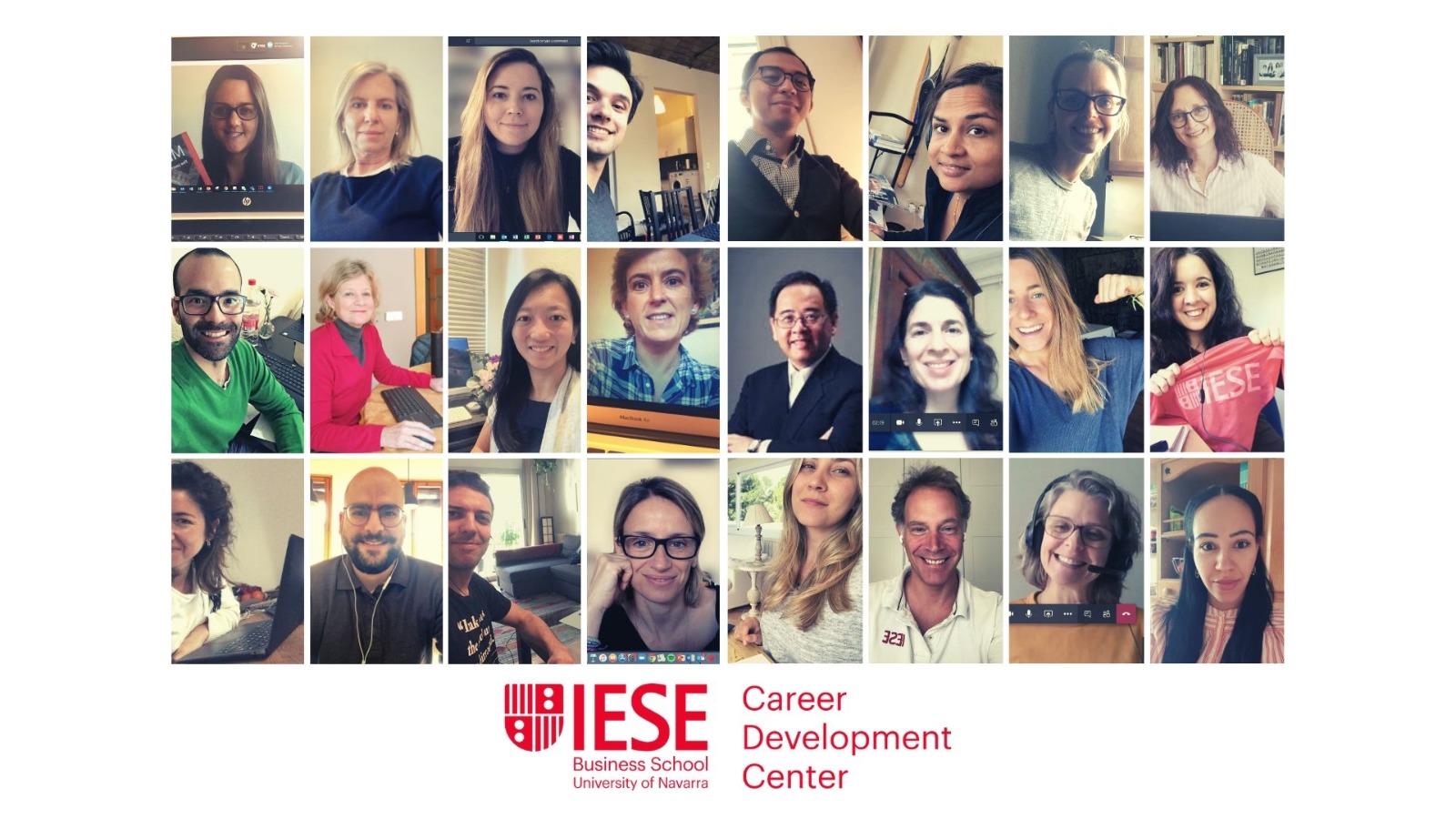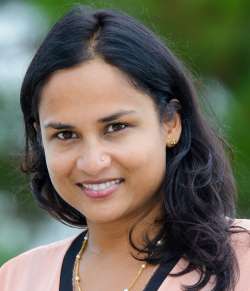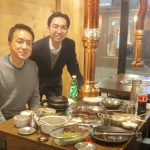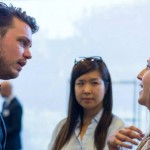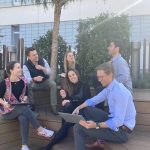Manuella is responsible for developing the Career Management programs for our MBA & MiM students. In this post, she tells us more about her background and her role in the CDC.
Can you please start by telling us something about yourself?
When I was young, maybe due to my Sri Lankan background, I was convinced that I hated the mountains and snow. Skiing was the last thing I would ever think about doing. But as the saying goes “Only fools never change their mind!”. At the age of 27 years, I finally discovered the sensation of skiing and the beauty of the mountain. And today, it’s the place where I find peace of mind. Nothing should be taken for granted. Everyone can find inner resources to change their mindset, behaviors or habits. I believe the only constant aspect of life is change.
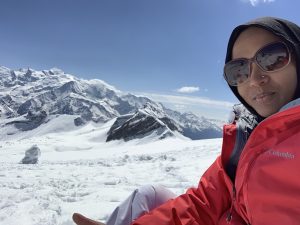
Enjoying some peace and quiet in the mountains
I hope you are enjoying the mountains in Spain! What brought you to IESE? How is living in Barcelona for you?
I started working at L’Oréal in 2006 and quickly joined the HR team where I found the perfect fit. In 2011 my husband was offered an expat position in Shanghai. We were looking for an experience abroad so we moved and L’Oréal gave me the opportunity to continue in the Learning and Development team there, managing training courses in the 14 countries of the region. It was a very fulfilling experience as I was getting to work in the very stimulating environment of custom programs where I would meet professors and discuss content with them.
In 2016 the expat contract came to an end and it was time to move back to Europe. One of the options on the table for my husband was Barcelona. It was a very tough decision to quit L’Oréal and a difficult one to choose between Paris – the safe option – and Barcelona – I did not speak a word of Spanish at that time. After reflecting on my constraints, my areas of interests, what was really important for me, it became clear that I was valuing above all the possibility to provide a good environment for my children to grow. Barcelona was clearly a step ahead on this point, so we took the challenge. I contacted a professor I had been in contact with at CEIBS, he quickly replied saying: “Thank you for your message Manuella, you combine professionalism and kindness, I think you could be a good fit for IESE. Send me your CV, I will recommend you there.” And here I am!
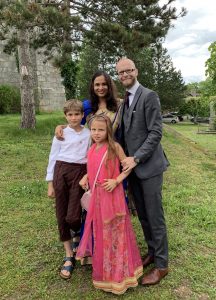
My family
Having lived in Barcelona for 4 years now, I have to admit I have never felt so accomplished. I am the 40 years old mother of two kids. My son Tao is 10 and my daughter Lou is 8. The kids feel at home here and so do we. My husband and I have both encountered a good balance between captivating jobs, family and social life. We love the environment. The people are really welcoming, we quickly made friends. Needless to say, the climate is a definite plus to the region’s attractiveness! So we even decided to buy a house. One would say this looks like the perfect receipt to happiness.
What is your role at IESE? Can you explain how the Career Development Center operates?
I am working in the Career Management team within the CDC department, where I work closely with our MBA and MiM students. Career Management is one of the pillars of the Career Development Center, along with Business Development and Career Counselling. Our mission as a department is to support students in their career development. To do so we work in 2 directions: partnering with companies to help them recruit the right talent to satisfy their needs on the one hand; equipping students with the right tools, resources and mindset to help them develop their careers on the other hand. The former is handled by my colleagues, the key account managers, organized by sectors of activity, while at Career Management we mainly focus on the latter. Career counselling is offered by all the team members in the CDC, we have an open door policy so students can request to meet with specific mentors depending on their needs (general or sector specific). We also partner with students in the Professional Clubs, designed to prepare students for application processes and put them in contact with companies.
Within this organization, the purpose of my role is to develop comprehensive training programs and activities around career topics as well as to coach students individually to help them define their career choice and create a plan. Through the trainings, we strive, together with the team, to provide students with the basic tools to be able to drive their own careers. One of the main events in which I take the lead is the Career Essentials course, in which students work on defining professional identity, setting career objectives, developing a strategy, refining their job-search skills and preparing to meet future employers. We also design sector-specific tracks where we offer specialized preparation for any given sector to adjust to the market reality, to recruiting processes and also organize activities such as Career Forums, workshops, company presentations and visits, recruitment events organized on-campus or virtually.
I’m sure all these activities must keep you very busy! What do you enjoy the most about your job? Did it meet your expectations, and did you face any surprises so far?
I love to notice in a person’s eyes the moment their mind shifts. It shifts because they see things differently, decide to act in another way, or realize no one else than themselves is best suited to drive their life. It is like a light switching on over a dark road, suddenly revealing a crossroads with clear directions to choose from… Career is a big part of our life. So, when I am in a coaching session and see I am definitely helping a student be fulfilled in their career, it really makes me happy.
I have always seen myself as people oriented, which probably explains the satisfaction I get from helping others. At the same time, related with my engineering background, I like structure and processes. What is great about my job is that I can make the most of these 2 aspects of my personality, on some occasion using strategy and structure to scale up trainings and help people grow within a group, on some others individually coaching people to understand their needs and guide them to reach their goals.
I come from a family of Sri Lankan immigrants who struggled to make a living in France. Before joining IESE, I had some doubts about working in a business school environment which I had considered to be “exclusive”. Now I can say the doubts have vanished and I feel that I’m in the right place, thanks to the extraordinary people I have met, the richness of their backgrounds, their cultural differences, the diversity of their education, and the hope that they will embody the changes the world needs. Thanks also to being aligned with IESE’s values, such as the excellence, integrity and spirit of service, now I feel I fully belong at IESE.
Of course, working at IESE also has its ups and downs, as in any organization (or I should say in any job), but if I take a step back and reflect, I have to say it went beyond my expectations! I am very grateful to the team, I feel lucky to be working in such a diverse environment, with colleagues coming from so many countries. You cannot imagine how much I have learned by working with Americans, Spaniards, Brits, Swedes, Lebanese, Brazilians, Chinese… Indeed, a very dedicated, supportive and caring team. We all share this spirit of service, helping each other and working for a common goal. It feels good!
What do you consider as your proudest achievement at IESE so far?
My proudest achievement is the Career Essentials course, fulfilling my personal mission when I joined IESE: to create a program equipping students with all the tools they needed to succeed in their job search.
For years, consulting and investment banking had been the primary jobs offered to MBAs, but the last 10 years have seen a gradual shift toward roles in corporate business environment as well as big tech companies, at an international level. At the same time, students are increasingly inclined towards a well-rounded life and wanted to take time to consider what could be the best options for them.
CDC has always been successful in preparing the students to consulting or investment banking where the recruitment processes and timelines are clear and structured, with fixed deadlines to apply, pre-established interview patterns… However, since the market was shifting we needed to adapt to this change and help students take more ownership of their career. CDC wanted to move from being seen as a “placement” agency to being a supportive partner in the job search process owned by the students. We work with companies to generate job opportunities, then it is up to the students to find the right fit and make it happen.
The objective of the new program is to enhance the number of students succeeding in the application or interview process, to give them tools so they could network and generate more opportunities in any sector, and to make sure they feel fulfilled in the career they have chosen. Several questions came up: how can we best guide students to find their own career path? How do we make sure we will manage to help all of our students find great job offers after graduation? Where do we find time in their agenda, already so busy with academics, Spanish classes, clubs’ activities, social and family life? Career workshops were often not prioritized, as many students did not see the immediate impact on their lives. The challenge was complex and we needed first to gain trust from the students but also from the faculty. After 3 years, we have created and include a “course” within the academic curriculum, to set the foundations of career management. We have also developed different sector-specific tracks to make sure we can answer to the needs of all students.
We managed to achieve this by finding synergies between academics and career department for the benefit of the students. This is a great step forward and I am convinced there is a lot more we can do in this direction because, in the end, the goal is the same for all the departments. The MBA is a transformational journey and it is all about personal development of our students.
Congratulations! I’m sure this course has benefitted many of our graduates. At work, your focus is usually on helping others to train and develop new skills. Any new skills that you personally would like to learn?
I’m working on developing coaching skills and public speaking skills but more than a skill, I would like to develop a mindset and attitude. I would like to be in a constant “change” state of mind, with the power or influence to make change happen. I hope this will also enhance my creativity and innovation.
I have a lot of ideas on how to improve the way we deliver career learnings to our students. The push approach works fine, but there are other options I want to explore with the team such as more individualized, more on-demand, more time-flexible offerings.
The job search is a stressful experience for many MBA students, even without a pandemic. Any tips or examples on how you relieve stress?
My kids love to watch the movie “Kung Fu Panda”. At some point, Wu Gui, the old Kung Fu master, says: “You are too concerned with what was and what will be. There is a saying: Yesterday is history, tomorrow is a mystery, but today is a gift. That is why it is called present.” This is one of my favorite quotes and I turn to it when I am stressed about the future.
Meditation, mindfulness, resilience are all powerful tools against stress, and there is a lot of literature around this so I will not develop on these. Rather, I would like to raise one very important idea for MBA students to keep in mind: Each of them is unique! This means each of them will have their own career, their own life, their own journey. I want to emphasize this because it is really easy in the MBA context to compare themselves to their peers and the comparisons tend to amplify stress. While it is true that they are all here in the same program, developing the same set of skills, and to a certain extent competing for jobs but in reality, each person’s success is linked to fit with a role or organization. Ultimately, fit depends on their uniqueness. This is not only a question of skills, but of the combination of skills and identity. Where they come from (education, culture, past experience), what they have to offer (strengths, competencies), what they value in life, where they would like to go…. After all the coaching sessions I have done with our students, I can tell you I have never met anyone that had the same combination. Some will take longer to find their way, others will be faster, but at the end they all find the right fit. The key to managing stress (and career!) is to know oneself deeply, own one’s identity and uniqueness.
The second point I would like to raise is: stay connected with people you trust, connect with people you don’t know, and tell your story. Check whether it all makes sense and get support or advice from these people. Keep your mind open because people grasp things that you will not have seen, they view them from a different angle. This is a powerful tool and trust me, it really works when you are open to look at different perspectives. I trust the power of blending people’s points of view. I have recently started writing articles where I try to summarize ideas brought up during discussions between people, I find it so enriching. At the end of the day, there are very few new ideas we genuinely create. They are already there, in the air, but formulated in a different way. It is just a matter of reprocessing them or restructuring them. This concept of networking is fundamental to career development.
Thank you for these useful tips! How has the last few weeks been for you? Any learnings or final advice you would like to share?
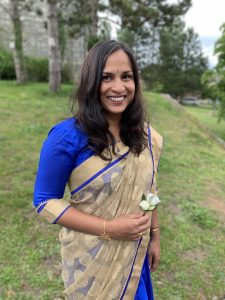
Learning to be more present during confinement
Focus on what you can control, do not try to control everything. This is my key learning of the lockdown period. Sometimes, I care and feel too much about what happens to others. As we entered the lockdown situation, I was trying to make sure everyone around me was feeling good: my kids, my husband, the students, my parents, my colleagues… Not only by checking up on them but also by taking actions I believed would help improve the situation. I would feel terrible when someone around was not doing great, so I would try to do more. In reality, I was just burning myself out. What’s more, I was going against my conviction that everyone has the inner resources to manage their own life. Other people’s mood is not something you can control. There are actions we can take to modify the environment, but changing emotions is only up to the persons themselves. Most of the time, I think I am helping when in reality I am trying to control. I realized that and decided I would always be present when they asked for help, but would not take actions that had not been requested. Not controlling doesn’t mean not helping, as much as helping doesn’t mean controlling. So from this lockdown This helps me to be more attentive to others, and most importantly closer to my own self.
Now I am working on doing things with a sharper focus, being more present at the very moment and letting go.
One last point I would like to add is that life is a constant learning. Although I feel I have achieved important things and feel accomplished as a person and as a professional, I know other difficult experiences will come. Of course, I am a bit anxious about what will come next, but I take it positively, because I know it will make me stronger. For me happiness is not about achievement, rather it is a state of mind.
Thank you Manuella for sharing your story! We look forward to more career advice from the Career Development Center in upcoming posts.
Pursue your dream MBA! Take these next steps today:


